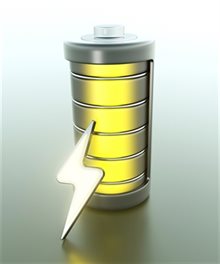The battery challenge
Increased electrification and the search for sustainable energy alternatives is driving development of battery technologies that can store green electricity and provide sustainable and cost-effective energy storage. Vanadium flow batteries are a mature and viable solution for long-duration energy storage (LDEs), but as there is no vanadium available in Europe, we must rely on unstable supply chains with vast price fluctuations. As an alternative to vanadium, some companies are exploring organic flow batteries, where the active material can be purposely synthesised. However, such organic molecules currently suffer from poor solubility, low stability, and high synthesis costs.
At the same time, Lithium ion (Li-ion) batteries are a prolific and well-established battery solution for everything from electric vehicles to appliances and devices. Yet, despite their low cost and high performance, Li-ion batteries require the use of CRMs, have a significant environmental impact, and are highly flammable.

The TNO solution
TNO set out to develop innovative electricity storage systems that address each of these specific challenges. The solution must be safe, scalable, and cost-effective, and based on organic materials readily available in large quantities. Our approach involved immobilizing organic molecules onto a carbon substrate for improved solubility and stability. To significantly reduce production costs and supply chain risks, TNO uses organic molecules already available in large quantities from the textile industry. This makes our solution more affordable and replicable within Europe, without reliance on other countries for sourcing CRMs.
Through research and expertise, TNO was able to realise a number of key advantages over other battery and storage solutions. Our Organic Electricity Storage system does not use CRMs, and material development is not geographically dependent. After screening more than one hundred organic compounds, we have identified molecules that are more stable in an aqueous solution than any other organic molecules currently investigated for energy storage. Laboratory tests on the active electrode material have indicated over 30,000 cycles with negligible performance loss, and we are now ready to scale up the technology towards a first kW-scale prototype.
Applications for storage and usage
TNO’s unique solution has resulted in far more application potential than originally anticipated. In addition to long-duration energy storage for grid stability, the same manufacturing method and materials can also be used to fabricate electrodes for supercapacitors, leading to a new solution for applications such as consumer electronics, wearables, and more. We are eager to explore the possibilities of this remarkable technology with engaged partners aiming to revolutionise the battery market with organically-based, scalable, and affordable battery solutions.
Join the revolution
Combining TNO’s innovative solution, materials, and unique approach with the expertise of key partners can help accelerate the development of high-capacity energy storage systems and next-generation organic supercapacitors that will power our future. Now that the designs have been proven, TNO is seeking both investors and strategic partners to develop full-scale prototypes, including multi-KW demonstrators and novel supercapacitor architectures. Partnerships of this kind will de-risk and accelerate the scale-up of this revolutionary technology.
Interested in partnering with TNO to enable scalable, cost-effective, safe, and organic electricity storage systems? Get in touch today to find out more.

